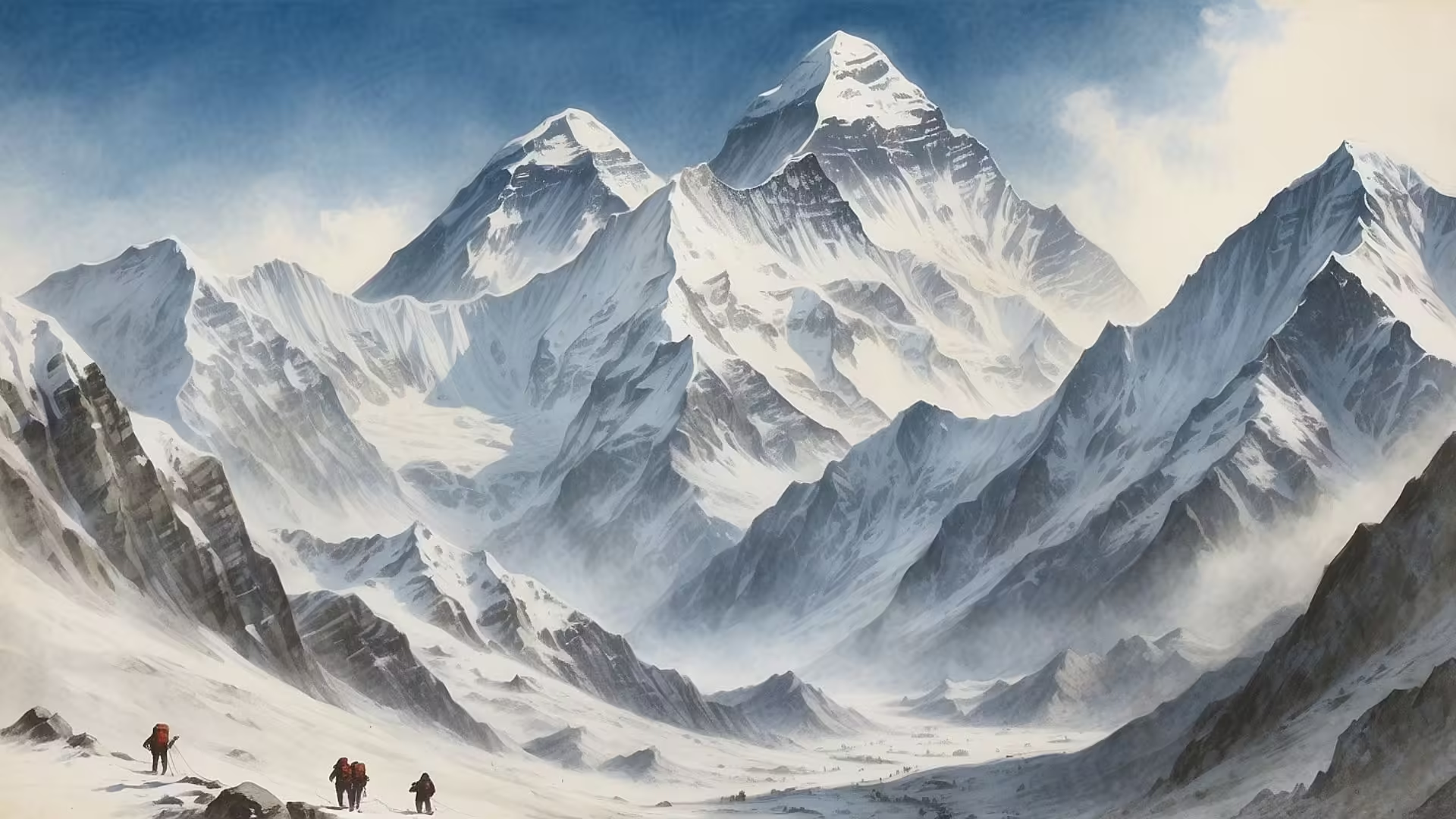Mount Everest has become synonymous with greatness and extreme achievement. Climbing it is considered the ultimate test of endurance, and its peak—the highest point on Earth—stands as a symbol of human ambition. But does being the highest point above sea level really make it the tallest mountain in the world? It turns out, that depends on how you measure height. In this article, we’ll explore what it means to be the tallest mountain and introduce a few rivals that challenge Everest’s reign.
Mount Everest: The Highest Altitude Above Sea Level
When most people talk about the “tallest mountain,” they usually mean the mountain with the highest point above sea level. In that regard, Mount Everest is the undisputed champion, with its summit rising 8,848.86 meters (29,031.7 feet) above sea level. Everest’s towering peak sits along the border between Nepal and China, making it part of the Himalayan mountain range. However, measuring height based solely on altitude above sea level gives a limited view. There are other ways to measure mountains, and Everest doesn’t come out on top in every case.
The Challenger from the Deep: Mauna Kea
If we measure height from base to summit, things start to get interesting. Mauna Kea, a dormant volcano in Hawaii, stands about 4,205 meters (13,796 feet) above sea level. But here’s the twist—Mauna Kea’s base sits deep on the ocean floor. When measured from its base on the seabed to its summit, Mauna Kea stretches more than 10,000 meters (33,500 feet). That makes it significantly taller than Mount Everest if we consider the mountain’s total height from top to bottom.
The Distance from Earth’s Core: Mount Chimborazo
Another way to look at height is by measuring how far a mountain’s summit is from Earth’s core. Earth isn’t a perfect sphere; it bulges slightly at the equator. Because of this bulge, the summit of Mount Chimborazo in Ecuador is the farthest point from the center of the Earth, even though its elevation is only 6,263 meters (20,548 feet) above sea level. In a way, Chimborazo beats Everest in terms of distance from Earth’s core—another reminder that “tallest” is a matter of perspective.
How We Measure Height Matters
These different measurements highlight how subjective the idea of “tallest mountain” can be. When measured by altitude above sea level, Everest holds the title. But Mauna Kea and Chimborazo challenge Everest when measured by other criteria. This shows that context matters when it comes to defining superlatives. Depending on what you prioritize—whether it’s height above sea level, distance from base to summit, or distance from Earth’s core—the title of tallest mountain shifts.
Why Everest Still Holds the Crown
Even with these challengers, Mount Everest remains the most iconic mountain in the world. Its cultural significance and status as the ultimate climbing challenge keep it at the top of everyone’s mind. Climbing Everest requires immense physical and mental preparation, and it draws mountaineers from across the globe, many risking their lives to reach the summit. While other mountains might technically surpass it in certain measurements, none have captured the human imagination quite like Everest.
So, is Mount Everest the tallest mountain in the world? The answer is yes—if we’re measuring altitude above sea level. But when we consider other ways to measure height, Mauna Kea and Mount Chimborazo offer compelling competition. What this debate really teaches us is that “tallest” can mean different things depending on how we choose to measure it. Whether you’re standing on the summit of Everest or diving to the base of Mauna Kea, each mountain offers its own unique challenge and sense of wonder. The real beauty lies in the fact that these giants—each in their own way—remind us just how vast and varied our world truly is.
Let’s Talk
So, Everest might be the tallest mountain—depending on how you measure it. Isn’t that wild? You grow up thinking, “Yeah, Everest is the tallest mountain in the world, end of story,” only to find out it’s not that simple. It kind of makes you wonder how often we accept things as facts without digging a little deeper. Like, how many other things in life are just one measurement away from being totally redefined?
The whole Mauna Kea thing really got me thinking. Imagine being a volcano that’s technically taller than Everest, but because half of you is underwater, nobody gives you the credit. It’s like being an incredible artist, but only your basement is full of paintings. The lesson here? Sometimes it’s not about what people see—it’s about the full picture. And isn’t that true for people too? How often do we judge someone based on the surface without realizing there’s so much more going on beneath it?
And then there’s Chimborazo. That one blew my mind. Who knew that Earth being slightly chubby at the equator would give it the edge over Everest in terms of distance from the planet’s core? It’s a great reminder that even in competition, the rules depend on how you look at things. One person’s tallest is another person’s farthest. It’s all about perspective, right? That’s a lesson you can carry with you anywhere—whether it’s how you approach work, relationships, or those frustrating days when nothing seems to go right. Change your perspective, and suddenly, things might not seem so impossible.
But here’s another thought—what makes Everest the “king” of mountains isn’t just its height. It’s the stories, the challenges, the people who risk everything to climb it. Everest isn’t just a mountain; it’s a symbol. And that got me thinking—how often do we assign meaning to things that go beyond their literal definition? Like, a coffee cup isn’t just a cup; it’s the thing that powers your morning routine. A gym membership isn’t just access to equipment; it’s a commitment to yourself. Maybe Everest’s real power is that it represents something bigger than just numbers on a measuring tape.
And honestly, there’s a lot to learn from the way people obsess over Everest. It shows that sometimes, the journey is more important than the goal. Think about it—how many climbers attempt Everest knowing full well they might not make it to the top? And yet, they still go, because the challenge itself is what matters. That’s kind of like life, isn’t it? The outcome isn’t always what you expect, but the effort you put in, the lessons you learn, and the person you become along the way are what really count.
It also makes me wonder—what’s your personal Everest? What’s that one challenge you keep coming back to, even if you’ve failed before? It could be anything—a project, a skill, even a relationship. And maybe the lesson isn’t about finally reaching the top but about learning something new every time you try. And hey, if the journey gets tough, just remember—you’re not stuck in the wrong place. Maybe you just need a new way to measure success, like Mauna Kea or Chimborazo. After all, tallest isn’t always the whole story.
Let’s Learn Vocabulary in Context
Let’s dive into some interesting words and phrases from our discussion about Mount Everest and see how they fit into everyday situations. First up is “altitude.” In the context of Everest, it refers to how high a place is above sea level. But you could totally use this in your daily life. For example, “I’m not great with altitude—I get dizzy on the second floor of a mall.” It’s a fun way to joke about feeling out of your comfort zone when you’re literally or figuratively on unfamiliar ground.
Then we have “summit.” While we talked about the summit of Everest as the highest point, you can use it to describe reaching any goal. “After months of work, finishing that project felt like reaching the summit.” It’s a great metaphor for moments when you finally achieve something after a long climb.
“Perspective” is another key word we explored. We used it to show how different measurements—like altitude versus distance from Earth’s core—can change the way we see things. In real life, shifting your perspective can be powerful. “I was frustrated with the delay, but changing my perspective made me realize it was a chance to catch my breath.” It’s all about finding new ways to approach old problems.
We also talked about “base.” For Mauna Kea, the base sits on the ocean floor, which makes it taller than Everest in a different way. In life, the base is where everything starts—your foundation. You could say, “I’m going back to the basics,” meaning you’re focusing on the fundamentals before moving forward.
“Challenge” popped up when we discussed climbing Everest. It’s not just about mountains—everyday life is full of challenges. “Learning to cook without burning everything is my latest challenge.” It’s a playful way to acknowledge that not every challenge involves scaling a mountain, but each one still requires effort.
Then there’s “symbol.” We mentioned that Everest isn’t just a mountain—it’s a symbol of human ambition. Symbols show up everywhere, like how a heart emoji is a symbol for love. You might say, “That old guitar is a symbol of my teenage dreams.” It’s not just an object—it carries meaning.
“Measurement” was important in the discussion too. Different ways of measuring height led to different winners. And in life, how we measure success can change everything. “I’ve stopped measuring my success by how fast I get things done and started measuring it by how happy I feel.” It’s a good reminder to find the right yardstick for yourself.
“Endurance” came up as well—climbing Everest requires both mental and physical endurance. But you don’t need to climb a mountain to practice endurance. “Getting through a Monday without coffee is an endurance test.” It’s about pushing through, even when things get tough.
And then we talked about “bulge.” Earth’s bulge at the equator makes Chimborazo the farthest point from the core. You can use bulge in a lighthearted way too. “After the holidays, there’s definitely a bulge in my suitcase that wasn’t there before.” It’s a playful way to describe things that expand unexpectedly.
Finally, let’s revisit “peak.” Everest’s peak is its highest point, but you don’t have to climb a mountain to hit a peak. “I peaked in high school” is a common joke, meaning you felt like you were at your best back then. Peaks are those moments when everything comes together, no matter where or when they happen.
Here are a couple of questions to think about: What’s a peak moment in your life where everything seemed to click? And what’s one challenge you’re currently facing that could benefit from a shift in perspective?










0 Comments